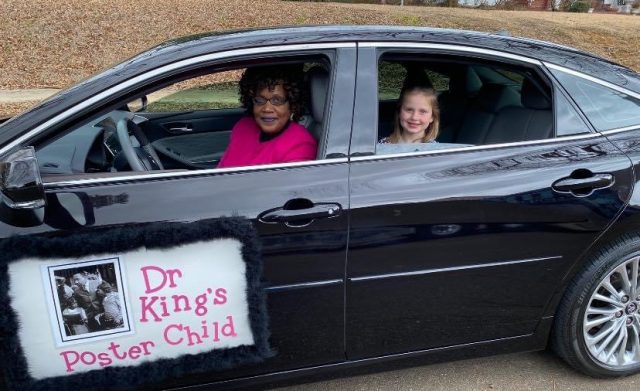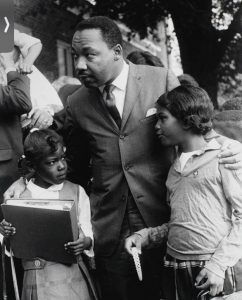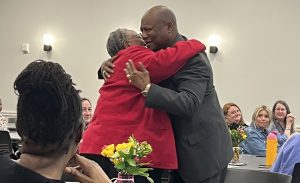
Eva Grace Lemon (left) rides with an admirer in a local parade. During an event at the university’s Jackson Avenue Center, the Grenada native recounted her experiences during the height of the civil rights movement. Submitted photo
OXFORD, Miss. – Nearly 60 years after her photo with the Rev. Martin Luther King Jr. made its way around the world, Grenada native Eva Grace Lemon joined classmate Charles Latham in discussing their hometown experiences during the height of the civil rights movement at a University of Mississippi event.
The Feb. 27 talk at the Jackson Avenue Center offered the intimate crowd an invaluable opportunity to hear firsthand accounts of civil rights leaders who fought long and hard before the term “educational equity” came into being.
“Equity in education is extremely important,” said Karen Davidson Smith, clinical associate professor of teacher education and director of diversity, equity and inclusion for the School of Education. “It is the process that recognizes the existence of advantages for some and barriers for others. As a result, we don’t all start from the same place, and equity works to level the playing field.”
Sponsored by the school’s Office of Diversity, the event wrapped up a monthlong celebration of Black History Month and continued the commemoration of the university’s 60th anniversary of integration.
Unknowingly representing the idea of equality for all, Lemon bravely marched alongside King in Grenada back in 1966.

Eva Lemon’s (left) small, black patent leather school shoes clack against the warm sidewalk, her stride in sync with Martin Luther King Jr. and her classmate Aretha as they push through a crowd of supporters and segregationists. Before they arrive at the school steps, a quick click of Bob Fitch’s camera captures the moment Lemon became King’s ‘Poster Child.’ Photo by Bob Fitch/Stanford University Libraries Department of Special Collections
“When we marched, all I could see were cameras,” she said. “We got to the school and he (King) pat me on the back and said, ‘Don’t be afraid, baby; go in and learn.'”
As a result, 7-year-old Lemon was jailed along with an amassed group of protesters seeking to integrate the Grenada School District, which was still segregated more than a decade after the 1954 Supreme Court ruling of Brown v. Board of Education.
“They put me in a big black bus at my age … but they couldn’t lock me up,” Lemon said.
Over the next several days, Black students and their supporters were attacked by townspeople opposing integration of the schools. Left without police protection, Lemon’s classmates and backers were brutally assaulted until the federal courts stepped in to put a stop to the Mississippi melee.
“I was very afraid of being around all the people,” Lemon said. “I knew of Dr. King, but I didn’t know he was as important as he was until later, when I became a teenager.”
A Grenada High alumna, Lemon still resides in the city and spends much of her time with her grandchildren. She participates in discussions around the civil rights movement and also takes part in local parades and attends events with state representatives, such as Miss Mississippi.
Her classmate Latham recalled having to leave the state after being kicked out of school in Grenada and joining the U.S. Marine Corps.
“As soon as I got out of the Marine Corps, I found myself in San Diego without a skill, so I went to a technical school and studied shipbuilding,” he said.
After receiving his diploma, Latham worked for the Navy for more than 20 years before retiring at age 51, when he decided to return to the Magnolia State.
“I kept longing to come back to Mississippi,” he said. “I always wanted to come back, but on my own terms.”

Charles Latham (left) and long-lost classmate Minnie Howard reunite at an event hosted by the UM School of Education’s Office of Diversity. Submitted photo
Latham returned to Mississippi where he has run for mayor of Grenada and serves on the citywide board for racial reconciliation.
During his visit on the Ole Miss campus, Latham joyously greeted Grenada High School’s first Black valedictorian, Minnie Howard, a former classmate he hadn’t seen since he fled the state.
Howard also detailed similar harrowing experiences of racism and threats of violence from the Ku Klux Klan.
“I was taken to the graduation site, and I gave my speech,” she said. “After (the speech), I was taken home by police and was told I should go in the house and stay there because they feared I might be injured that night.”
Abbey Shane, a native of Colleyville, Texas, and master’s student in curriculum and instruction, felt riddled with emotion hearing the accounts of Latham and his classmates.
“I did not get to grow up hearing personal stories about the civil rights movement,” Shane said. “Having this firsthand experience got me emotional, and it will help me teach my students (that) you just need to understand, accept and support those around you.”
The event concluded with Lemon signing copies of her famous photo, provided with the permission of Stanford University Libraries Department of Special Collections.